Teachers, Nurses Protest In Iran Amid High Inflation
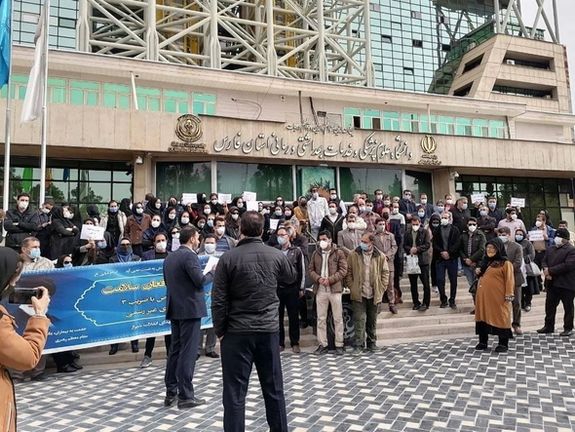
Iranian teachers have started a nationwide strike to demand higher salaries and release of their colleagues who were arrested during previous protests.

Iranian teachers have started a nationwide strike to demand higher salaries and release of their colleagues who were arrested during previous protests.
According to the Coordination Council of Iranian Teachers’ Trade Associations, the strike, which started on Saturday will last for two days and will be followed by a protest rallies.
This week’s demonstration is scheduled for Monday, while the teachers have announced they will stage another strike and protest in about two weeks too.
In the previous rounds of rallies, the teachers gathered in front of the parliament building in Tehran and the provincial offices of the education ministry to protest the parliament’s adoption of a discriminatory ranking plan.
Also on Saturday, Iranian nurses held protests in many cities across the country to protest higher pay and long-term contracts.
Workers and employees from various economic sectors hold regular protest rallies or strikes to demand better working conditions and salaries.
Earlier in January, hundreds of firefighters and staff members from Iran’s hardliner judiciary department took to the streets in several cities, in what was an unprecedented development. Even prison guards have picketed to protest their low salaries.
Food prices have risen by more than 60 percent in recent months, on top of high inflation in the previous three years, while the government is unable to sufficiently boost wages

Iran newspaper Saturday said ex-president Mahmoud Ahmadinejad was damaging Iran’s security by alleging a United States-Russian plot to invade Iran and Ukraine.
In a speech to supporters in Tehran Thursday, Ahmadinejad warned of a "danger of invasion and war" after a "dirty deal" between the two world powers. "I have accurate knowledge that Russia and the US have traded Iran and Ukraine,” he said. “The US will allow Russia to invade Ukraine…allowing the US to move onto Iran.”
"Who has allowed you to make secret deals behind the scenes over Iran?" he asked the world powers Washington and Moscow. "You shouldn't be under the illusion that all Iranians are simpletons like a number of officials that you have met” – possibly referring to President Ebrahim Raisi (Raeesi), recently in Moscow, or Iranian diplomats in the Vienna nuclear talks.
Iran newspaper, which is government-owned, posed a series of questions about the former president’s outburst: “Whose interests is Ahmadinejad trying to secure, and to whom is he offering the gift of instilling fear in the Iranian people? Where is Ahmadinejad getting his ‘accurate information’ from?”
The newspaper was in no doubt that the former president’s claim was “clearly an act against national security.” And “more importantly, it should be clarified who has instilled such false and contrived information in him?"
‘Satan’s partner’
Ahmadinejad, who left office in 2013 and was not cleared to run in the 2017 and 2021 presidential elections, has become a strident critic of foreign policy, with comments laced with allegations of conspiracies.
Ali-Akbar Javanfekr, Ahmadinejad's close associate and confidante, has called Russian President Vladimir Putin “a partner of the Great Satan,” meaning the US.
In his latest speech, Ahmadinejad argued that Russia had “always been against the Iranian people,” and has “always sold Iran,” referring to the expansion of the Russian empire at the expense of Iran’s Qajar dynasty during the early nineteenth century. There were clear parallels with Tehran’s current, relatively warm relations with Russia, Ahmadinejad argued: "Now some people have come out of nowhere saying Russia has changed!"
Since June Ahmadinejad has also criticized Iran's 25-year cooperation agreement with China, which was officially launched during Foreign Minister Hossein Amir-Abdollahian's recent visit to Beijing. During his trip to Moscow last week, Raisi presented a draft of a strategic bilateral agreement to Putin.
While reformist Arman-e Melli newspaper suggested Ahmadinejad should find a better way to "be seen and to influence the government and the society," Iran newspaper said it was "too simplistic" to see Ahmadinejad's remarks as a way just to attract attention.
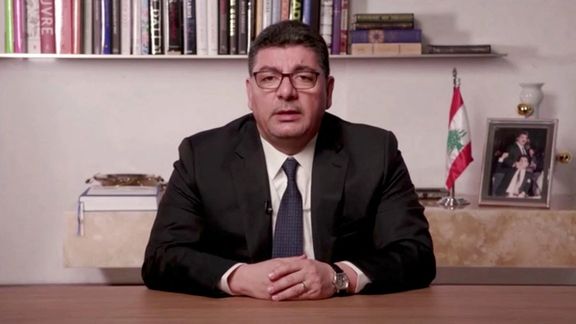
Bahaa al-Hariri the son of slain former Lebanese Prime Minister Rafik al-Hariri has announced he is entering politics after his brother Saad pulled out of public life.
Bahaa, 55, said he would "continue the journey" of Rafik al-Hariri, who, with Saudi backing, established the Hariri family as the dominant player in Lebanon's Sunni community before his assassination in 2005. Iran-backed Hezbollah was accused of carrying out a bloody bombing that killed the prime minister.
Saad al-Hariri, a three-time prime minister who made compromises with Hezbollah, lost some of influence and backing from Saudi Arabia, before he withdrew from politics.
Saad's announcement upended Lebanon's sectarian politics four months before a parliamentary election, adding to the uncertainties facing a nation grappling with a devastating financial crisis.
"Through partnership and solidarity, we will enter the battle to take back the country and the sovereignty of the country from its occupiers," said Bahaa, an apparent reference to Hezbollah of which he is a fierce critic.
Although he will not be a candidate in the upcoming elections, Bahaa said, "The son of the martyr Rafik Hariri will not leave Lebanon, I am with you and very soon I will be among you.”
It is not clear if Bahaa can fill the void left by Saad al-Hariri and put up a serious challenge to Hezbollah’s influence.
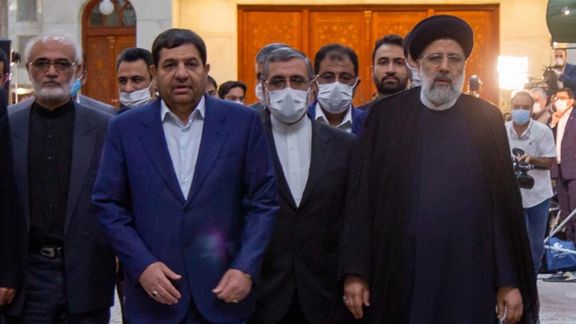
Media and critics have published the names of many appointees in Iran's government who are relatives of top officials, after the president's categoric denial.
Raisi responded to a question in a televised interview Tuesday night about giving big jobs to his and his ministers' relatives and friends, by saying that all appointments in his government are based on merit and insisted that no one can name even five individuals in his government who have been appointed to a post based on their family ties.
Raisi said if anyone knew of five cases, they should name the individuals, and he would launch an investigation into the matter. Earlier, Supreme Leader Ali Khamenei had also told the government to look into the matter and eliminate possible doubts in the government's integrity.
During the past two days, first moderate website Rouydad24 named and published the pictures of two dozen officialswho are either Raisi’s and his wife's relatives or are the relatives of some other top officials in the government. Later, Aftab News website also quoted social media users who had named far more than five such cases. The website, however, politely observed that Raisi may have been misinformed by his aides about nepotism in his government.
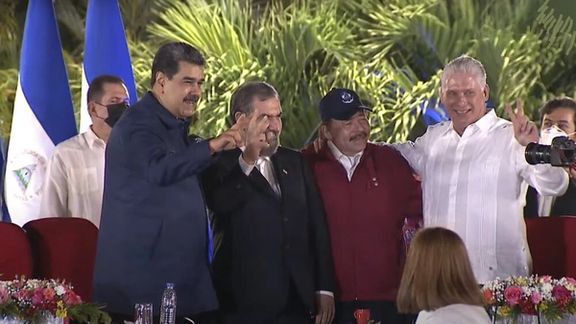
Among those named by Rouydad24, there are a few relatives of Raisi and his wife including Meysam Nili, a brother of Raisi's son-in-law Meqdad Nili, who has been appointed as an adviser to Culture Minister. He also has a second job as an adviser to the chairman of the Islamic Propagation Organization. Meanwhile, a cousin Raisi’s wife Zeynab Kadkhoda has been appointed as the dean of the faculty of Dentistry at the University of Tehran.
Mohammad Mehdi Ahmadi, the son-in-law of Mohsen Rezaei the vice president for economic affairs was first appointed as the governor of Bank Saderat, but stepped down quickly as soon his family connection to Rezaei was disclosed on social media. However, after a few weeks, Ahmadi was appointed as the governor of Bank Shahr affiliated with the Municipality of Tehran.
Mohammad Mehdi Rahimi, a close relative of former Majles Speaker Gholam Ali Haddad Adel, who is himself a relative of Khamenei, has been appointed as the director general of public relations at Raisi's office. In another appointment, Elham Akbari, the wife of influential lawmaker Ahmad Naderi has been appointed as an adviser to Culture Minister.
In similar developments, Sajjad Safar Harandi the son of Expediency Council member Mohammad Hossein Saffar Harandi has been appointed as the new manager of the Islamic Art and Culture Center, Hossein Amerian, the son of another influential hardliner Lawmaker Ms. Laleh Eftekhari has been appointed as the chairman of the pension fund of Iran's Steel Industries, and Davoud Azizi, a brother of lawmaker Mohammad Azizi who has studied nursing, has been appointed as the chairman of the Islamic Republic's Tennis Federation.
On the other hand, Health Minister Bahram Einollahi has appointed his son-in-law Shahed Fadaifar as his adviser at the ministry, and Mohammad Mohammadian, an official at Khamenei's office has helped his son-in-law Mehdi Eslampanah to rise to the position of the chairman of National Standards Organization.
Several others have also been named by the two websites. However, Aftab News claimed that Raisi should not have strictly denied the possibility of nepotism. He should have known that even one example of nepotism can tarnish his integrity. Raisi was so certain about his claim that he called those who talk about nepotism in his government as "accomplices of the enemy."
The Iranian Labor News Agency (ILNA) quoted Wahab Azizi, a conservative activist and leader of Jahadgaran Party which supported Raisi in the presidential election as saying that that Raisi and his aides are distributing power through these appointments in a way as if “they have conquered a foreign country.”
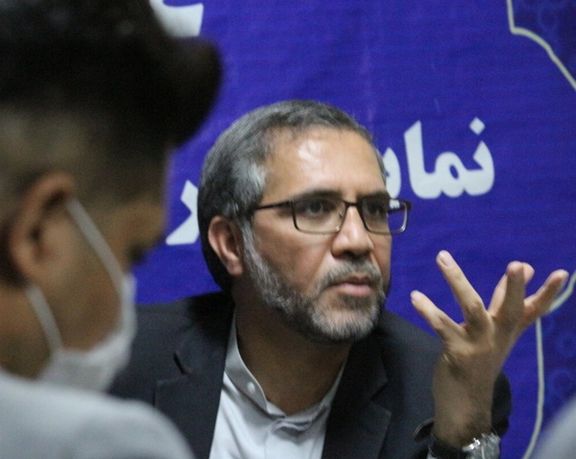
An Iranian lawmaker said Friday that the long-term agreement signed with China does not need ratification by parliament because it is not “a binding” contract.
Abbas Golru, member of parliament’s national security and foreign policy committee told Tasnim news agency in Tehran that the 25-year agreement with China is a document of understanding and “a framework for cooperation.” He added that so far, no binding treaty or agreement has been signed between the two countries.
In recent months, the Islamic Republic has touted the agreement with China as a major political and economic breakthrough that would provide a lifeline for its broken economy amid United States' sanctions. In mid-January, foreign minister Hossein Abdollahian visited Beijing and discussed expanding relations. Tehran claimed that the 25-year agreement was “activated” during the trip.
Iranian politicians who are currently out of power, as well as pundits and thousands of Iranians on social media have criticized the regime’s quest to attach itself to China and Russia. Tehran is also trying to sign a 20-year deal with Russia, but so far, Moscow appears not to be interested. Many have also questioned the fact that the contents of the agreement have been kept secret.
Golru also maintained that for the deal with China to become binding specific agreements must be signed in various fields and ratified by the parliaments of both countries.

Human Rights Watch says Iran is committed to crush any grassroots effort to protect human rights and urged world powers to press Tehran to stop the crackdown.
The rights group said on Friday that the recent heavy sentence meted out against prominent political prisoner Narges Mohammadi shows that Iran’s revolutionary courts are criminalizing human rights activism.
In a five-minute trial on January 15, Branch 26 of Tehran’s revolutionary court sentenced rights defender Mohammadi to eight years in jail and 70 lashes on charges not announced or explained by authorities.
According to her husband, Taghi Rahmani, the summary trial was held behind closed doors and that she was denied access to a lawyer.
“Iranian authorities’ cruel detention and prosecution of Narges Mohmmadi only one year after she was released from an earlier prison term and then piling on more unfair prison sentences are clearly intended to crush her into silence at all costs,” said Tara Sepehri-Far, senior Iran researcher at Human Rights Watch.
She also called on authorities to free the rights activist, saying, “The authorities should immediately and unconditionally release Narges Mohammadi, who has already unjustly been imprisoned for years.”
“People like Narges Mohammadi are the ones who work to bring Iranian civil society together,” Sepehri-Far stressed, noting that “Governments that are engaging diplomatically with Iran should make sure to press the government to stop its relentless crackdown against human rights defenders.”
In a letter from the notorious Gharchak (Qarchak) Prison, obtained by Iran International, Mohammadi said the court stated her nomination for the Nobel Peace Prize as evidence of her criminality.
"What reveals the hostility and baselessness of the charges [brought against me] and the legal procedure leading to the ruling is that I have been found guilty for being nominated by the Norwegian Amnesty for the Nobel Peace Prize," Mohammadi, a lawyer by profession, wrote from prison.
In March 2021, the chairman of Amnesty International in Norway announced that two members of the Norwegian parliament had nominated the Iranian human rights activist for the Nobel Peace Prize, backed by the local Amnesty branch.
Moreover, in a joint statement by German Federal Government Commissioner for Human Rights Luise Amtsberg and French Ambassador for Human Rights Delphine Borione on Thursday, denounced Mohammadi’s conviction as unjust and expressed extreme concern that her detention in Gharchak Prison may further worsen her health, referring to her serious neurological disease that causes muscular paralysis.
“It was with dismay that we learned that Narges Mohammadi has been sentenced to eight years in prison and 70 lashes. Narges Mohammadi’s peaceful campaign for women’s rights and the improvement of the human rights situation in Iran, in particular for the abolition of the death penalty, is not a criminal offence,” read the statement.
“We call on Iran’s political leaders to comply with the country’s obligations under international law and to release Narges Mohammadi immediately”, they said.
Mohammadi was arrested in mid-November at the death anniversary of a citizen, Ebrahim Ketabdar, who was shot dead by security forces during the November 2019 protests.
She is the vice-president of the Defenders of Human Rights Association, the Chair of the executive board of the Peace Council of Iran, and a member of "Step-by-Step Abolition of Execution" campaign.
Mohammadi has been to jail several times over the past two decades. She was freed from Evin Prison in September 2020 after serving more than five years when she had no contact with her husband and children for long periods of time.
Iran executed 299 individuals in 2021, including four juvenile offenders -- a 26-percent increase compared with 2020. Courts issued 85 death sentences until December 20.
Persecution of human rights and political activists and execution have increased since hardliner president Ebrahim Raisi took office last August.